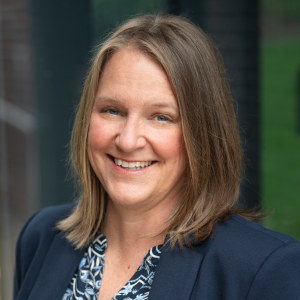Dear Friends of the College,

As part of our training, we chemists develop the ability to identify a molecule that we want to make and then work backward to design the sequence of steps and most efficient path needed to synthesize it, a process known as retrosynthesis. Retrosynthesis is a fundamental part of how chemists think. We plan and use data to evaluate progress, confirm or adjust direction, and to ultimately reach the target molecule (or, in some cases, go back to the drawing board). Even as we approach the potential for digital twins to optimize chemical syntheses and enhance retrosynthetic thinking, when it comes to navigating short- and long-term planning for the college, artificial intelligence is not quite ready.
Retrosynthesis is thus a habit of thinking and skill that I have deeply appreciated (thank you, Professor Dan Piccolo!) in my leadership roles, as I’ve applied it to complex, multidimensional challenges—from leading a University-wide revision of the general education curriculum to mitigating pandemic impacts on our college’s missions and now convening conversations and drafting the college’s strategic plan for the third time. Now, we must again think deeply—together—not just about our core missions and where we are heading but also about our core values and why we are dedicated to science as a distinctly important human endeavor.
Our college’s core missions are learning, discovery, and societal impact through scientific research and the education of future generations of the science and technology workforce. We have a clear vision for excellence and achievement.
As we pursue these goals, it is important to pause—especially when it is difficult—and remember what drives us to do this work.
For me, it’s the jobs we create: The grant dollars we secure and the thousands of students who come to Penn State to learn bring positive impacts to local and regional economies. The more than $130 million in annual research expenditures in our college alone, in addition to supporting groundbreaking research, has an important local economic impact by creating jobs and supporting salaries and benefits. We attract students from around the world to learn and discover with us, and together we maintain a foundation of scientific expertise that has been—and continues to be—an engine for Pennsylvania’s economy and beyond.
It’s also the discoveries we make, which expand our understanding of the world and answer fundamental questions humans have pondered for millennia. These discoveries will surely shape the future in ways we cannot yet predict and will continue to inspire our curiosity about the world around us. Science instills awe, often serves as a reminder to remain humble about what we do not yet know, and gives us the foundation to keep searching for answers.
Most important to me, it is also because our work ensures that the world will be a better place for future generations—for our children, grandchildren, and the world around them. I deeply believe in the transformative power of science and education to elevate society and to safeguard a safe, healthy, prosperous, and sustainable future. As the largest college of science at the only land-grant university in Pennsylvania, the Eberly College of Science has incredible scientific strengths and large impacts—not only because of the University’s size but also because of our unique role in the state. We are central in both place and purpose.
The Eberly College of Science has had a legacy central to Penn State since it was established. In this issue of the magazine, we highlight former physics professor Erwin Müller, as just one example of the internationally renowned science legacy in our college. We also feature examples of how our faculty and their research teams are reaching for the future, including in quantum materials and neuroscience, and how our students, staff, and faculty are building today the legacy of tomorrow.
To reach our goals, we need all of you: students, faculty, staff, alumni, and friends of the college. Together, we must strive to be open and supportive to all who come to work and learn alongside us, contributing to this mission, as we push forward with great optimism and confidence in the power of science in our world and for the future.
Regards,
Mary Beth Williams
Acting Dean
